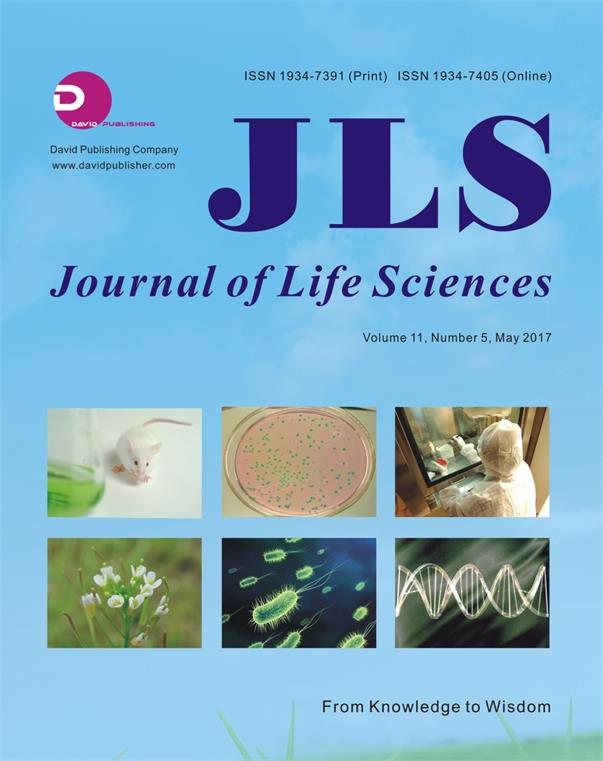 |
[email protected] |
 |
3275638434 |
 |
 |
| Paper Publishing WeChat |
This work is licensed under a Creative Commons Attribution-NonCommercial 4.0 International License
Website:http://www.davidpublisher.com/Home/Journal/JLS
Frequency: Monthly
Volume 15, Number 1, January 2021 (Serial Number 115)
Information for Authors
1. Submission of Manuscript: The manuscript should be original, and has not been published previously. Do not submit material that is currently being considered by another journal. The manuscript should be in MS Word format, submitted as an email attachment to our email address: life-sciences(@)davidpublishing.com or life-sciences(@)davidpublishing.org
2. Some Requirements: Manuscripts may be 3000-12000 words or longer if approved by the editor, including an abstract, texts, tables, footnotes, appendixes and references. The title should be on page 1 and not exceed 15 words, and should be followed by an abstract of 100-200 words. 3-8 key words or key phrases are required.
3. Transfer of Copyright Agreement: Authors of the articles being accepted are required to sign up the Transfer of Copyright Agreement form.
4. Hard Copy: Author will receive 1 hard copy of the journal containing their articles.
5. Publication Fee: We will charge some fee if the paper is published in our journal.
Manuscript Preparation and Organization
Manuscripts should follow the style of Journal of Life Sciences, be written in concise and grammatically correct English, and be presented in a manner and at a level that will be accessible to the broad readership of the journal.
Original manuscripts must be prepared using a standard word processing program (such as Microsoft Word). Manuscript pages should be numbered and prepared with single line spacing, use settings for standard 21 cm × 28.5 cm paper. Figures should be digitally prepared.
Organize the manuscripts in the following order: Title Page, Abstract, Key words, Introduction, Materials and Methods, Results and Analysis, Discussion, Conclusions, Acknowledgments, and References. Note that when submitting your manuscript the References must be placed at the end of your document file. Tables and figures should be included as part of your manuscript file.
Title Page The title page should include the authors’ full names and affiliations, the name, highest education, acedemic title, research fields and e-mail address of the corresponding author.
Manuscript Title The full manuscript title should be succinct (approximately 120 characters) and informative. The title should include sufficient detail for indexing but be general enough to be clear to the broad readership. Abbreviations and acronyms, including those for gene and protein names, should be avoided in titles or the general nature of the abbreviated entity should be clear.
Abstract You should focus on the structure and English use, this part should include the purpose, topic, method and achievements of the study and around or less than 200 words. Key words should be more than 3 and less than 8.
Tables Tables should be located in the main text which they are referred. Prepare tables using Word's table feature. Please do not use color, shading or graphics in tables. Number tables consecutively as they are first mentioned in the text. Provide a concise title for each table. Add table notes to make a short general description or explain the meanings of some symbols and abbreviations if necessary.
Figures Refer to all diagrams, graphs and photographs as “Fig.”. Number figures consecutively according to the order in which they are called out in the text. Figures should be unambiguous and as conceptual as possible and should provide enough information so that the reader can understand them without significant input from the text. Provide a short title for each figure.
JLS does not allow certain electronic enhancements or manipulations of micrographs, gels, or other digital images using Photoshop or any other software. If multiple images are collected into a single figure, be sure to separate them clearly with lines. If a digital tool is used to adjust contrast, brightness, or color, it must be applied uniformly to an entire image; targeted alteration of only part of an image is prohibited.
Figure size The journal is printed with the two-columns format. The width of one column is about 8 cm and a two-column width is about 17 cm).
We need to receive your figures in electronic form. To minimize publication time of your manuscript and help you get the best printed figures it is important that all electronic artwork is supplied in the correct format and resolution. Please save vector graphics (e.g. line artwork) in EPS format at 600dpi, and bitmap files (e.g. half-tones) in TIFF format at 300dpi.
Black and white figures Do not save black and white or grayscale images in color mode such as RGB or CMYK, as this will result in huge file sizes.
Color figures We welcome color figures but please note the current options available. We will then reproduce these figures in grayscale in the hardcopy, but in color online. So if there are color figures in your paper, you can use different lines or symbols to instead of colors if necessary. If the authors indeed want to print the figures in color, they will be charged some color printing fee.

